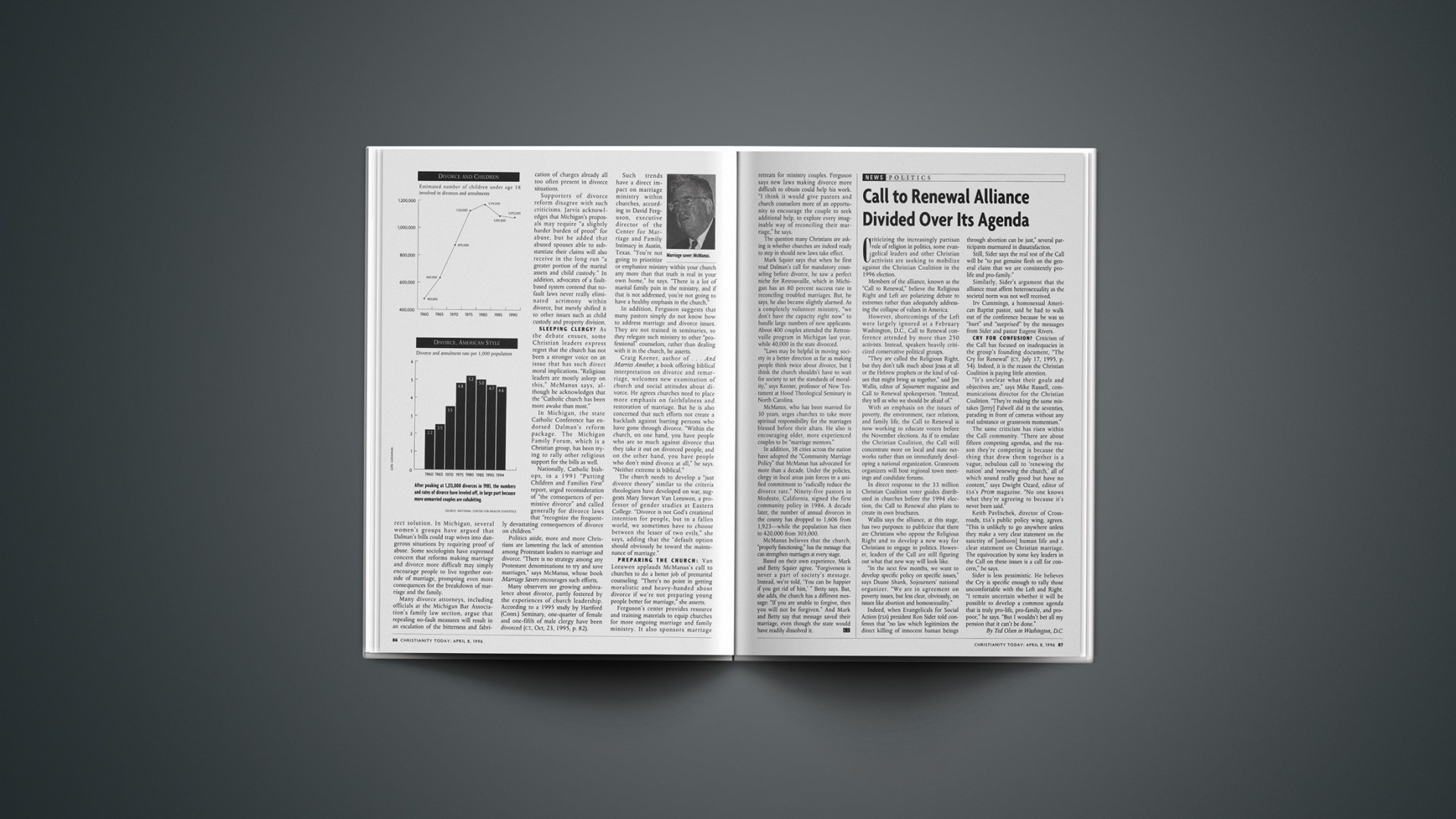Criticizing the increasingly partisan role of religion in politics, some evangelical leaders and other Christian activists are seeking to mobilize against the Christian Coalition in the 1996 election.
Members of the alliance, known as the "Call to Renewal," believe the Religious Right and Left are polarizing debate to extremes rather than adequately addressing the collapse of values in America.
However, shortcomings of the Left were largely ignored at a February Washington, D.C., Call to Renewal conference attended by more than 250 activists. Instead, speakers heavily criticized conservative political groups.
"They are called the Religious Right, but they don't talk much about Jesus at all or the Hebrew prophets or the kind of values that might bring us together," said Jim Wallis, editor of "Sojourners" magazine and Call to Renewal spokesperson. "Instead, they tell us who we should be afraid of."
With an emphasis on the issues of poverty, the environment, race relations, and family life, the Call to Renewal is now working to educate voters before the November elections. As if to emulate the Christian Coalition, the Call will concentrate more on local and state networks rather than on immediately developing a national organization. Grassroots organizers will host regional town meetings and candidate forums.
In direct response to the 33 million Christian Coalition voter guides distributed in churches before the 1994 election, the Call to Renewal also plans to create its own brochures.
Wallis says the alliance, at this stage, has two purposes: to publicize that there are Christians who oppose the Religious Right and to develop a new way for Christians to engage in politics. However, leaders of the Call are still figuring out what that new way will look like.
"In the next few months, we want to develop specific policy on specific issues," says Duane Shank, "Sojourners'" national organizer. "We are in agreement on poverty issues, but less clear, obviously, on issues like abortion and homosexuality."
Indeed, when Evangelicals for Social Action (ESA) president Ron Sider told conferees that "no law which legitimizes the direct killing of innocent human beings through abortion can be just," several participants murmured in dissatisfaction.
Still, Sider says the real test of the Call will be "to put genuine flesh on the general claim that we are consistently pro-life and pro-family."
Similarly, Sider's argument that the alliance must affirm heterosexuality as the societal norm was not well received.
Irv Cummings, a homosexual American Baptist pastor, said he had to walk out of the conference because he was so "hurt" and "surprised" by the messages from Sider and pastor Eugene Rivers.
CRY FOR CONFUSION? Criticism of the Call has focused on inadequacies in the group's founding document, "The Cry for Renewal" (CT, July 17, 1995, p. 54). Indeed, it is the reason the Christian Coalition is paying little attention.
"It's unclear what their goals and objectives are," says Mike Russell, communications director for the Christian Coalition. "They're making the same mistakes [Jerry] Falwell did in the seventies, parading in front of cameras without any real substance or grassroots momentum."
The same criticism has risen within the Call community. "There are about fifteen competing agendas, and the reason they're competing is because the thing that drew them together is a vague, nebulous call to 'renewing the nation' and 'renewing the church,' all of which sound really good but have no content," says Dwight Ozard, editor of ESA's "Prism" magazine. "No one knows what they're agreeing to because it's never been said."
Keith Pavlischek, director of Crossroads, ESA's public policy wing, agrees. "This is unlikely to go anywhere unless they make a very clear statement on the sanctity of [unborn] human life and a clear statement on Christian marriage. The equivocation by some key leaders in the Call on these issues is a call for concern," he says.
Sider is less pessimistic. He believes the Cry is specific enough to rally those uncomfortable with the Left and Right. "I remain uncertain whether it will be possible to develop a common agenda that is truly pro-life, pro-family, and pro-poor," he says. "But I wouldn't bet all my pension that it can't be done."
By Ted Olsen in Washington, D.C
Copyright © 1996 Christianity Today. Click for reprint information.









